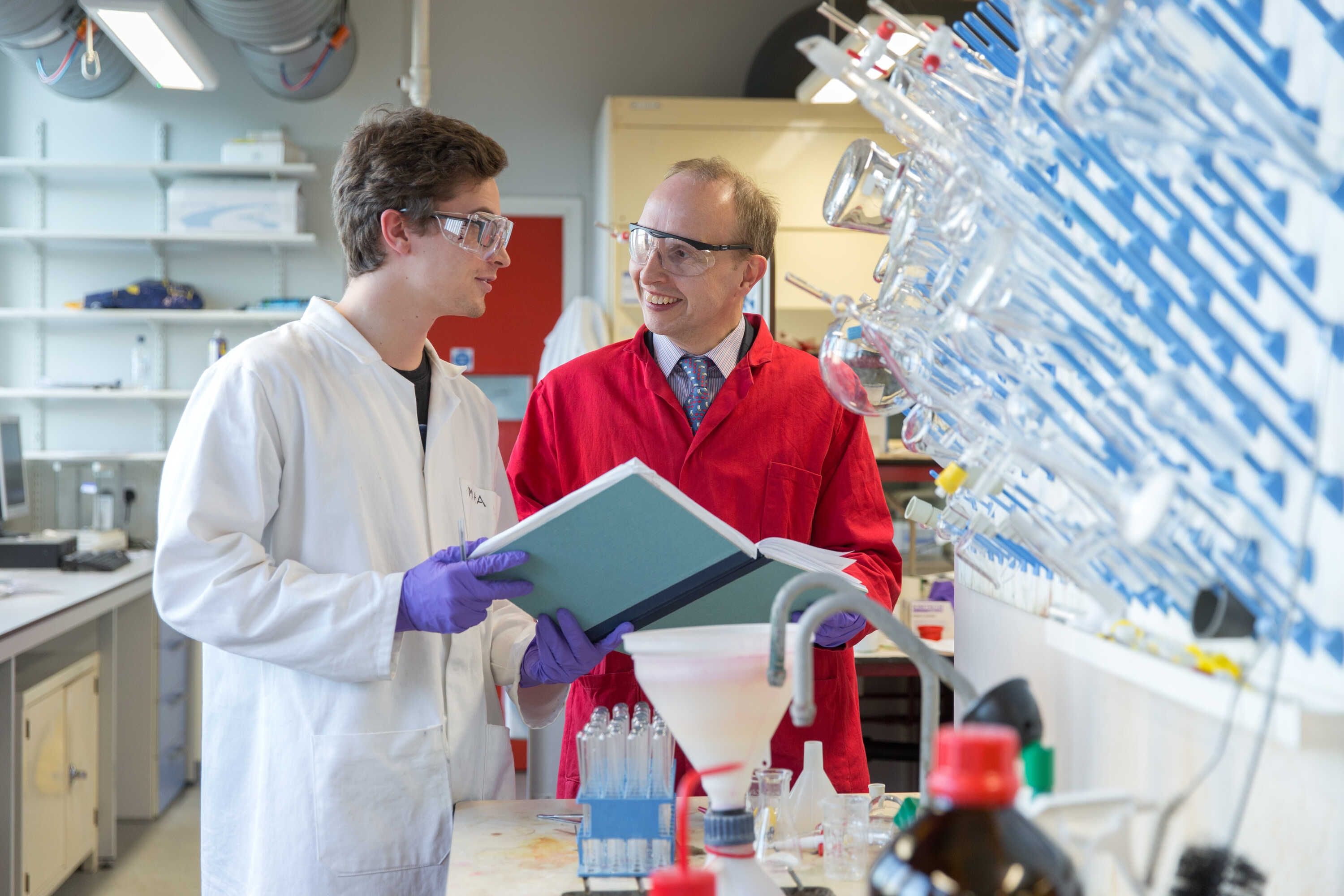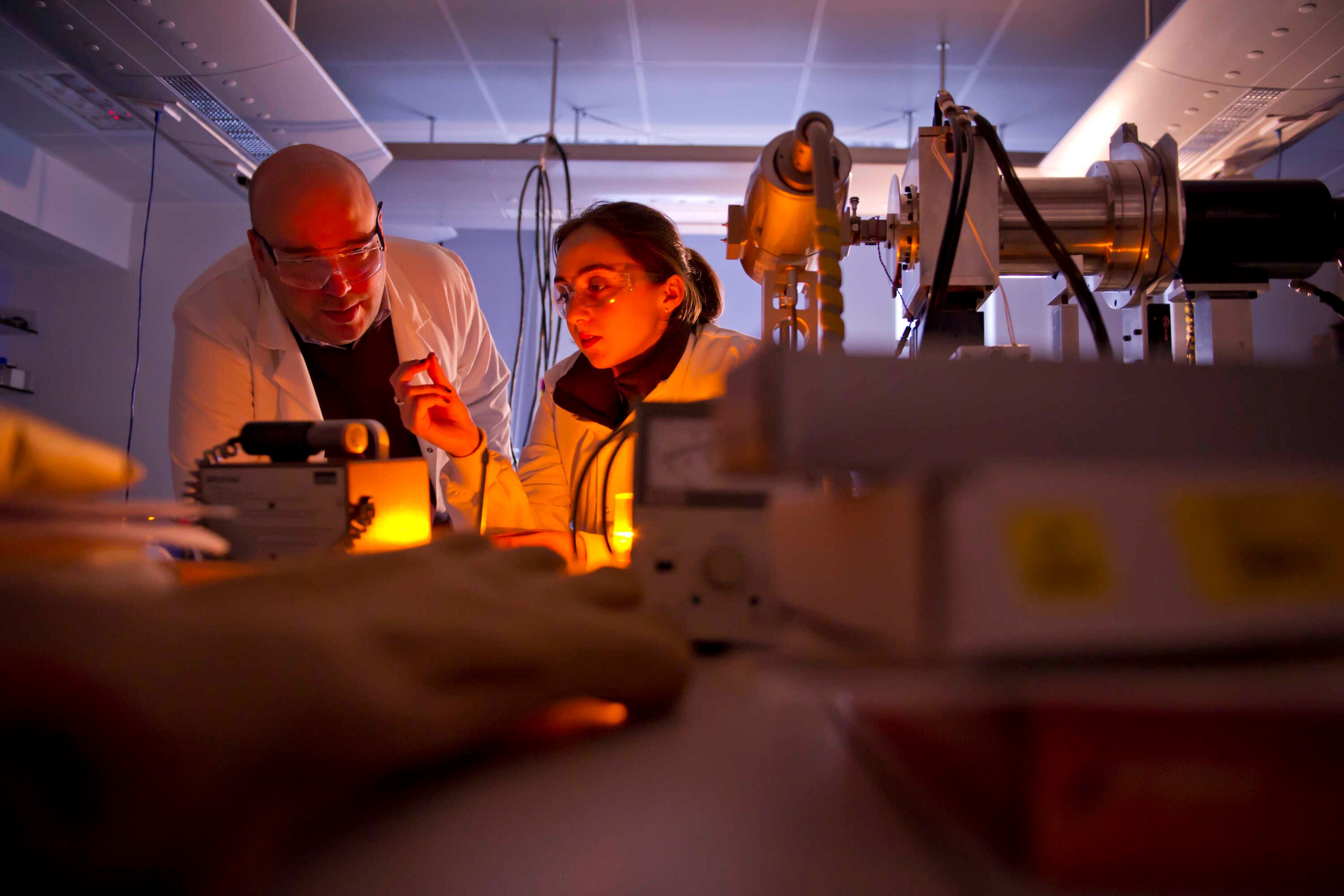
Drug Discovery and Development: Multidisciplinary Science for Next Generation Therapeutics
Build your expertise in multidisciplinary drug discovery research and explore emerging technologies.
Build your expertise in multidisciplinary drug discovery research and explore emerging technologies
Receive radical insights into the global state of drug discovery from leaders in the field
Develop your own ideas on an extensive nine-month research project
Course key facts
-
Qualification
-
MRes
-
-
Duration
1 year
-
Start date
September 2025
-
Study mode
Full-time
-
Fees
£14,900 Home
£41,300 Overseas
-
Delivered by
-
Location
-
White City
-
Minimum entry standard
-
2:1 in chemistry, pharmacy, physics, biochemistry, medicine or an appropriate subject
Course overview
Gain a deeper understanding of the current global state of drug discovery and development on this one-year stand-alone course.
You'll enhance your knowledge of the drug discovery process and explore emerging technologies as well as the future direction of the industry.
Teaching is guided by leaders in the field, on a versatile programme that incorporates talks on clinical trials and the regulatory process.
You'll develop ideas on how to focus research to meet the pressing challenges of drug discovery through Journal Club meetings and an extended research project.
Research training takes place within a multidisciplinary environment which will give you the opportunity to develop the knowledge and skills to work in industry or go into further research.
Structure
This page is updated regularly to reflect the latest version of the curriculum. However, this information is subject to change.
Find out more about potential course changes.
Please note: it may not always be possible to take specific combinations of modules due to timetabling conflicts. For confirmation, please check with the relevant department.
You’ll take the following core modules.
Core modules
You’ll critically review the literature relevant to your research project and present your idea.
The case study dissertation builds on your critical analysis skills from the literature review.
You'll choose a topic area unrelated to your research to gain an understanding beyond the scope of your projects.
In the Journal Club module, you'll work collaboratively and build your teamwork and communication skills towards a joint presentation.
This will feed into your final presentation and builds on your work in the previous two modules.
You'll undertake a research project, which incorporates a literature review, research manuscript, oral exam and oral presentation.
The presentation will assess your ability to communicate scientific research effectively to a wide audience.
The project should also demonstrate awareness of relevant research within the field and a broad range of methodology/experimental or analytical techniques and research outcomes.
Teaching and assessment
Teaching and learning methods
-
Lab work
-
Computational work
-
Seminars
-
Lectures
-
Practical work
-
Virtual learning environment
Assessment methods
-
Literature review
-
Dissertation
-
Presentations
-
Research manuscript
-
Research project
-
Oral exams
Entry requirements
We consider all applicants on an individual basis, welcoming students from all over the world.
How to apply
Apply online
You can submit one application form per year of entry. You can choose up to two courses.
Application deadlines – Round 1 closes on Thursday 16 January 2025
We operate a staged admissions process with several application rounds throughout the year.
Apply by 23.59 (UK time) on the closing date of an application round, to ensure you receive a response on your application by the relevant decision date.
Application rounds
Round 1
- Apply by Thursday 16 January 2025
- Decision by Thursday 6 March 2025
Round 2
- Apply by Thursday 27 March 2025
- Decision by Thursday 1 May 2025
Round 3
- Apply by Thursday 15 May 2025
- Decision by Thursday 17 July 2025
There is no application fee for MRes courses, Postgraduate Certificates, Postgraduate Diplomas, or courses such as PhDs and EngDs.
If you are applying for a taught Master’s course, you will need to pay an application fee before submitting your application.
The fee applies per application and not per course.
- £80 for all taught Master's applications, excluding those to the Imperial College Business School.
- £100 for all MSc applications to the Imperial College Business School.
- £150 for all MBA applications to the Imperial College Business School.
If you are facing financial hardship and are unable to pay the application fee, we encourage you to apply for our application fee waiver.
Find out more about how to apply for a Master's course, including references and personal statements.
Unless you are from an exempt nationality, you will need an ATAS certificate to obtain your visa and study this course.
Nationals from the following countries are exempt: Switzerland, Australia, Canada, Japan, New Zealand, Singapore, South Korea, USA and EEA members.
Use this information when applying for an ATAS certificate to study this course:
- CAH code: CAH07-02-01
- Descriptor: chemistry
- Supervisor name: Professor Oscar Ces
Get guidance and support for obtaining an ATAS certificate.
The description of the MRes course that you should use in your ATAS application is the below:
- Title of the research: MRes in Drug Discovery and Development: Multidisciplinary Science for Next Generation Therapies
- Description: The project will involve multidisciplinary scientific training and research in drug discovery science including synthetic medicinal chemistry and biological assessment of active compounds. The course consists of a 9-month research project, taught courses in elementary and advanced aspects of drug discovery techniques and applications, specialist lectures in transferable skills and group discussion sessions. Students select a research project from a range of proposals submitted by collaborating staff during the first week of the course.
Tuition fees
Home fee
2025 entry
£14,900
You should expect and budget for your fees to increase each year.
Your fee is based on the year you enter the university, not your year of study. This means that if you repeat a year or resume your studies after an interruption, your fees will only increase by the amount linked to inflation.
Find out more about our tuition fees payment terms, including how inflationary increases are applied to your tuition fees in subsequent years of study.
Whether you pay the Home or Overseas fee depends on your fee status. This is assessed based on UK Government legislation and includes things like where you live and your nationality or residency status. Find out how we assess your fee status.
If you're a UK national, or EU national with settled or pre-settled status under the EU Settlement Scheme, you may be able to apply for a Postgraduate Master’s Loan from the UK government, if you meet certain criteria.
For courses starting on or after 1 August 2024, the maximum amount is £12,471. The loan is not means-tested and you can choose whether to put it towards your tuition fees or living costs.
The loan is not means-tested and you can choose whether to put it towards your tuition fees or living costs.
Overseas fee
2025 entry
£41,300
You should expect and budget for your fees to increase each year.
Your fee is based on the year you enter the university, not your year of study. This means that if you repeat a year or resume your studies after an interruption, your fees will only increase by the amount linked to inflation.
Find out more about our tuition fees payment terms, including how inflationary increases are applied to your tuition fees in subsequent years of study.
Whether you pay the Home or Overseas fee depends on your fee status. This is assessed based on UK Government legislation and includes things like where you live and your nationality or residency status. Find out how we assess your fee status.
If you're a UK national, or EU national with settled or pre-settled status under the EU Settlement Scheme, you may be able to apply for a Postgraduate Master’s Loan from the UK government, if you meet certain criteria.
For courses starting on or after 1 August 2024, the maximum amount is £12,471. The loan is not means-tested and you can choose whether to put it towards your tuition fees or living costs.
The loan is not means-tested and you can choose whether to put it towards your tuition fees or living costs.
How will studying at Imperial help my career?
Develop the essential core knowledge and skills for a career in drug discovery.
Learn what it takes to conduct translational multidisciplinary research to prepare for PhD studies.
The Department of Chemistry also has strong sponsorship links with industry for those considering further study at PhD level.
Our graduates often pursue further study in master's programs or doctoral research.
Further links
Contact the department
- Telephone: T: +44 (0)20 7594 2678
- Email: chemres@imperial.ac.uk
Course Directors: Professor Ed Tate and Dr Benjamin Schumann
View the Department of Chemistry website.

Request info
Find out more about studying at Imperial. Receive updates about life in our community, including event invites and download our latest Study guide.

Events, tasters and talks
Meet us and find out more about studying at Imperial.

Terms and conditions
There are some important pieces of information you should be aware of when applying to Imperial. These include key information about your tuition fees, funding, visas, accommodation and more.
You can find further information about your course, including degree classifications, regulations, progression and awards in the programme specification for your course.
Programme specifications